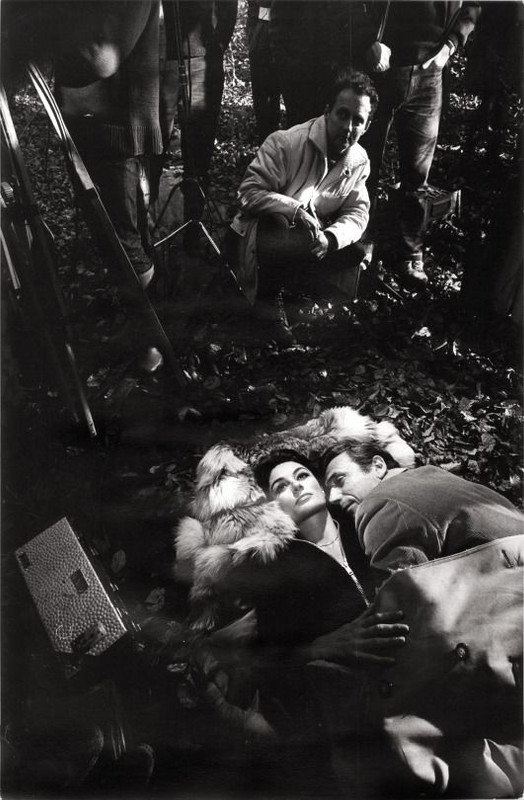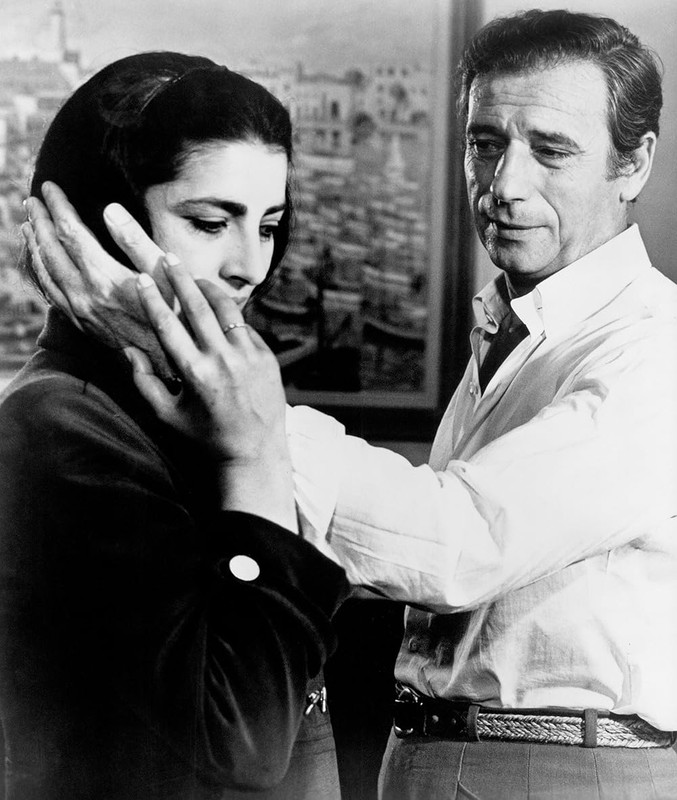“F-R-double-E-D, D-O-M spells Freedom! We fight for freedom, for one and for all! It's you-and-me-dom, and ten foot tall! Freedom, freedom, and oh-can-you-see-dom, we'll always beat 'em with star-spangled freedom!”Mr. Freedom (William Klein, 1968)
Mar
23
freebie: liberty

Mr. Freedom (John Abbey) in his American football outfit carries Marie-Madeleine (Delphine Seyrig) is his muscular manly arms. Tagline: OH! OHHH! MR. FREEDOM! YOU KILL ME. DP: Pierre Lhomme.
Freebie: “Give me liberty or give me death!” (Patrick Henry, March 23, 1775)
– Mr. Freedom singing his theme song
yvesmontand
Un soir, un train [One Night, a Train] (André Delvaux, 1968)
Mar
18
André Delvaux

Anouk Aimée and Yves Montand in character on a leaf-strewn floor, his head resting on her chest, with director André Delvaux and others surrounding them. DP: Ghislain Cloquet.
A favourite film, director, or producer for Luc Besson's birthday (1959).
Having only seen three of Delvaux's films, I feel I can safely say his work is hypnotic, but not in the common sense. We see a world through both Delvaux's and his protagonists eyes, and experience their duality as one. This displacement is a recurring theme in Delvaux's work, the work of a man raised in one world and speaking the language of another, both worlds bearing the same name, Belgium.
This slow tear is also the theme is his best known film, De man die zijn haar kort liet knippen [The Man Who Had His Hair Cut Short] (1965), in which a schoolteacher loses himself after a pupil graduates. When we think we are firmly seated in Delvaux's universe, we fall back, like that moment just before sleep sets in. And again, in his tragically under-seen Belle from 1973. Now it's a poet who finds a woman living in a ramshackle hut in Belgium's peatland, her language an unknown. With only one main speaker, the duality forms in the poet's words, in his attempts to give her root.
And so do we, the viewers. We hang on to that root, Delvaux's, only to sink back into our own loss of words.
Compartiment tueurs [The Sleeping Car Murder] (Costa-Gavras, 1965)
Nov
8

Eliane Darrès (Simone Signoret) – comédienne, by herself – takes a long hard look at her table-set-for-two. DP: Jean Tournier.
Un soir, un train [One Night, a Train] (André Delvaux, 1968)
Mar
20
French Language Day

Mathias (Montand) and Anne (Aimée) walk through a round archway. Both have a different focus and are on opposite sides of the arch as a foreshadowing of their parting. DP: Ghislain Cloquet.
A Walloon language professor and his French set designer fiancée are at an impasse. While his Flemish students vocally protest against more Walloon influence at their uni, the couple – who superficially speak the same #language, #French – struggles to find the right words. They meet, part ways, then find each other again on a train that at morning turns out to be standing still in the middle of nowhere. The man, now without her, disembarks and with two acquaintances who also were on that train tries to find out where he and she are.
André Delvaux's Un soir, un train is a masterpiece about finding the right language in a fractured world.
“If she is innocent! Why do you never wonder if Parris be innocent, or Abigail? Is the accuser always holy now? Were they born this morning as clean as God's fingers? I'll tell you what's walking Salem — vengeance is walking Salem. We are what we always were in Salem, but now the little crazy children are jangling the keys of the kingdom, and common vengeance writes the law!”Les sorcières de Salem [The Witches of Salem / The Crucible] (Raymond Rouleau, 1957)
Mar
7
National Town Meeting Day

The townspeople meet in the barn to judge the accused. DP: Claude Renoir.
Raymond Rouleau's Les sorcières de Salem – with a screenplay by Marxist philosopher Jean-Paul #Sartre – is a very early film adaptation of Arthur Miller's 1953 #TheatrePlay The Crucible. An allegory of #McCarthyism, the play is a (partially dramatised) retelling of the #SalemWitchTrials, a dramatic episode in early US-American history. During several court and town meetings, 200 people were falsely accused of meddling with the Devil; 19 of them were eventually executed.
– Arthur Miller, The Crucible (1953)
Miller himself was accused of un-American activities in 1956 and convicted of contempt of Congress for refusing to identify others present at meetings he had attended. Which doesn't mean that #WitchTrials are a thing of the past. As easily one can transplant Puritan religious mass hysteria to 1950s McCarthy anti-socialism, as easy is it applicable to the state of the world today.
“A single cannon is fired and a teacher's monthly salary goes up in smoke.”Z (Costa-Gavras, 1969)
Jan
1
Z Day

Hélène (Irene Papas) and Z (Yves Montand). DP: Raoul Coutard.
– Z